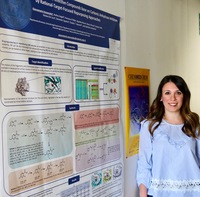Giannamaria Annunziato, Università degli Studi di Parma, Italy

Today, our #Iamamedicinalchemist is Dr Giannamaria Annunziato from the Università degli Studi di Parma, Italy.
Where and when did you obtain your PhD diploma?
I obtained the Ph.D. diploma in March 2017 at the University of Parma, spending four months at ETH of Zurich as visiting Ph.D. student.
What was the topic of your PhD project?
“New strategies to eradicate Microbial Resistance”, I’ve been involved into a very challenging and exciting project, from the synthesis of small molecules as inhibitors of pathogens’ “non-essential” pathways to the total synthesis of natural products derivatives endowed with antimicrobial activity.
Where did you have your postdoc position?
I had a postdoc position as a Medicinal Chemist at the University of Parma.
Where do you work at the moment and what is your current position?
At the moment I am Assistant Professor of Medicinal Chemistry at the Department of Food and Drug of the University of Parma and also, I am the representative of Medicinal Chemistry under-35 years old scientists at the Italian Chemical Society (Società di Chimica Italiana, SCI Giovani).
What are your current research interests?
Now I have the opportunity to work on different topics; I am still working on my former PhD project, trying to find small molecules as adjuvants of already existing antibiotics for which pathogens have developed resistance. From my point of view this is a very promising approach in this field because these targets that are “non-essential” are less prone to mutate and their inhibition make bacteria more susceptible to the attack of the host immune system and antibiotics. Another project in which I am involved is focused on the development of pharmacological chaperones able to restore the physiological activities of a mutated proteins underlying human diseases and, finally, I am also working on natural extracts in order to identify natural compounds endowed with interesting nutraceutical activities.
How would you describe yourself as a supervisor?
I always try to make my students curious about their work, pushing them to be patient, motivated, hard-working and creative which I think are the most important skills in this work.
Which scientist do you admire the most and why?
Rita Levi Montalcini, the first and only (up to now) Italian woman which won the Nobel prize in Medicine and Physiology. In my opinion she has been one of the most important Italian scientists, and I appreciate her commitment in science but also in social problems at a time when women hardly have chances.
Did you experience any unfair situations during your scientific career?
Fortunately, no
Which paper of yours you are the proudest of and why?
I am proud of every single paper I have contributed to publish in a scientific journal, there is a lot of studies and work behind all of them. Anyway, up to now, the paper for which I am proudest is my first as corresponding author, on the discovery of a new class of antifungal agents that selectively inhibits microbial carbonic anhydrase. Journal of Enzyme Inhibition and Medicinal Chemistry; 2018, 1, 1537-1544.
Which field of medicinal chemistry do you consider the most promising in the future?
The concept of pharmacological chaperone therapy has been emerging in the last years and is very intriguing and interesting. Pharmacological chaperones are small molecules that bind into a target protein and stabilize its native structure helping mutated proteins to restore their biological function. The ability to restore the native physiological function of a protein trough a small molecule or bio-macromolecule is something really exciting and challenging to obtain. Such modulators can find large applications in misfolding human diseases, such as neurodegenerative diseases, so I think that they will play an increasingly important role in the medicinal chemistry field in the next decades.
